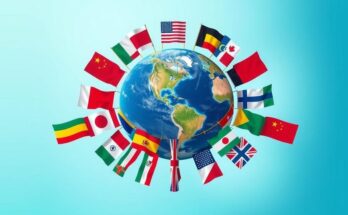Algeria and Tunisia’s boycott of the Arab Summit highlights their diplomatic isolation and anti-Morocco sentiment. Algeria criticized the summit’s preparatory process, claiming exclusion from discussions critical to the Palestinian cause. The geopolitical landscape reveals Algeria’s hypocrisy regarding its simultaneous support for the Polisario Front and openness to relations with Israel. Their exclusion of Morocco from regional cooperation reflects ongoing tensions within the Arab League. As these dynamics unfold, Algeria’s role in Arab diplomacy appears increasingly marginalized.
Recent diplomatic developments reveal an intriguing scenario as Algerian President Abdelmadjid Tebboune and Tunisian President Kais Saied opted to boycott the emergency Arab Summit in Cairo. This decision, just days before the summit on March 4, highlights their increasing isolation within the Arab world and their antagonism towards Morocco. An official statement from Algeria indicated that President Tebboune’s absence was due to perceived irregularities in the summit’s preparatory process, alleging that a select number of Arab countries had monopolized the discussions without adequately consulting others concerned about the Palestinian issue.
The personal sentiment expressed by a source close to the Algerian presidency pointed to President Tebboune’s dissatisfaction with the exclusionary nature of the summit’s planning. Furthermore, the Alcalde has conveyed the need for unity among Arab nations in support of the Palestinian cause amidst its current challenges. To represent Algeria, Foreign Minister Ahmed Attaf was delegated to attend the summit instead.
In a concurrent move, Tunisia also excluded its president from the summit, with President Saied dispatching Foreign Minister Mohamed Ali Nafti to reaffirm Tunisia’s commitment to Palestinian rights, including the establishment of an independent Palestinian state with Jerusalem as its capital. Notably, the previous Arab Summit hosted in Algiers in November 2022 was marked by a lack of tangible progress on significant issues, including the Palestinian situation, despite the grand infrastructure built for such events.
Algeria’s reaction appears driven by a desire to counter what it perceives as marginalization within the Arab community. Although emphasizing solidarity towards Palestinian causes, Algeria’s alliances and interests have often diverged from broader Arab consensus. The vacuum felt after the October 7 war has exacerbated Algeria’s feelings of exclusion, signaling a need for introspection regarding its diplomatic strategies.
Noteworthy criticism has emerged regarding Algeria’s inconsistent positions, especially concerning its support for the Polisario Front, which contradicts its professed commitment to Palestinian self-determination while undermining a fellow Arab state. This architectural betrayal of solidarity epitomizes Algeria’s broader geopolitical maneuverings within North Africa, especially pertaining to Morocco’s territorial integrity.
President Tebboune’s recent statements to French media reflect a potential willingness to establish ties with Israel, a stark contrast to his previous rhetoric condemning normalization efforts by Morocco. This contradictory stance leads to a perception of considerable hypocrisy amidst the backdrop of Algeria’s trading relationships with Israel, despite vocal opposition to Israeli policies against Palestinians.
Moreover, Algeria’s and Tunisia’s pledges to collaborate under the “Maghreb Union,” while intentionally excluding Morocco, continue to unfold amidst regional discontent. The unwillingness to recognize Morocco’s participatory role in these discussions exemplifies an ongoing rift that hampers meaningful cooperation in North Africa. Recent events signal that Algeria’s pursuit of a fragmented political bloc is neither supported by expanding allies nor conducive to fostering unity among Maghreb nations.
Consequently, Algeria’s attempts to incite division within the Arab League appear to be falling flat, as the bloc has reaffirmed its solidarity with Morocco’s sovereignty over Western Sahara. Despite Algeria’s obstructive diplomatic stance over the decades, the Arab League’s continued endorsement of Morocco’s autonomy initiative marks a significant alignment among Arab states.
Overall, the actions of Algeria and Tunisia—in their decision to boycott the emergency Arab Summit—underscore a strategic withdrawal that belies a deepening political isolation, driven increasingly by antagonism towards Morocco masked under the guise of support for Palestinian solidarity.
The decision by Algeria and Tunisia to withdraw from the Arab Summit illustrates their growing isolation and sets the stage for future diplomatic challenges. Despite their claims of solidarity with Palestine, their geopolitical strategies, particularly regarding Morocco, reflect a hypocritical stance that weakens their influence in regional matters. As Algeria continues engaging in contradictory policies, its position within the Arab League becomes increasingly tenuous, suggesting a concerning trend of isolation from key Arab initiatives.
Original Source: www.moroccoworldnews.com




